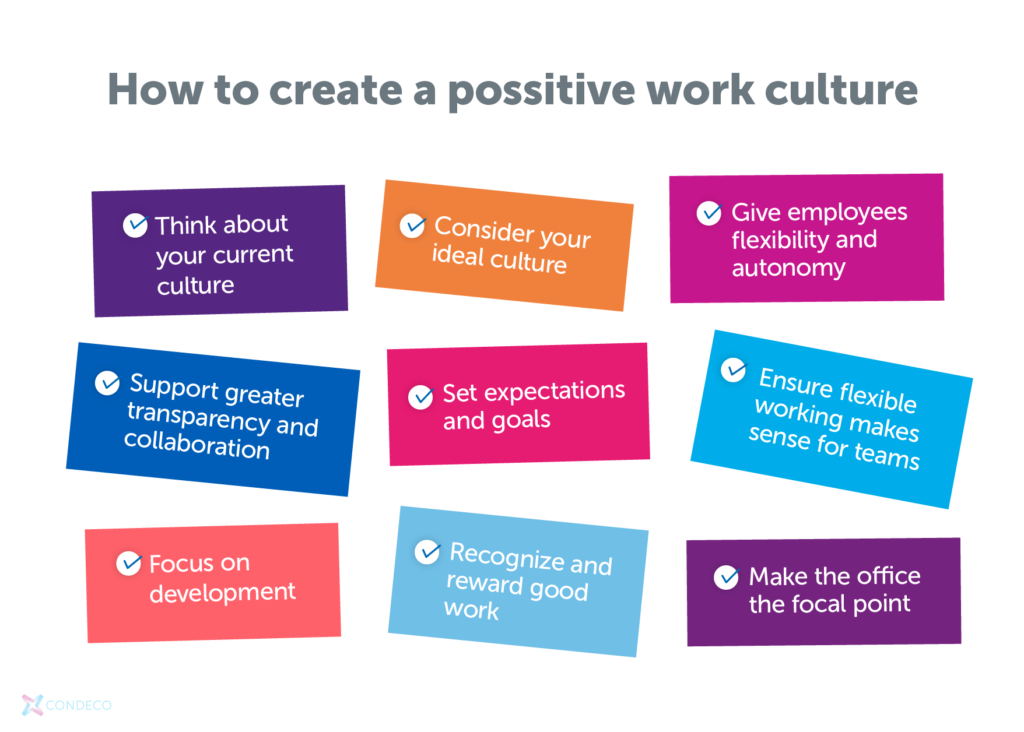
Having a strong, positive work culture may not feel like it has a direct effect on the overall success of a business, but the benefits of ensuring that employees are happy, motivated and emotionally invested in your success can’t be underestimated.
When employees feel more positive about their jobs, they’ll be more productive and help the business achieve more day-by-day. What’s more, they’ll want to stay on with the company for longer and tell their friends and industry contacts what a great employer they have – a valuable asset at a time of great turbulence in the job market.
So, how can you go about developing a positive work culture, especially in a much-changed business world where flexible and remote working is far more commonplace? This blog explores nice key principles that show your way forward.

Think about your current culture
- Before you make changes, think about your current company culture
- Bear in mind that your own perspective may be completely different to your employees’
- Speak to your employees to gain a more detailed insight of how they see your culture
Consider your ideal culture
- There’s no one-size-fits-all when it comes to culture, so think about the qualities that you want to be integrated into your own
- Different companies will have different prioritie?
What vision do you have for your company?
Give employees flexibility and autonomy

At a time when employee experience is so highly valued by the workforce, employees increasingly want working arrangements and schedules that fit in better with the rest of their lives. That means taking a leading role in deciding where and when they work. But every employee is different, and what may work for some won’t work for others, so taking a uniform approach to flexible work isn’t practical.
Instead, it’s better to give individual employees the autonomy to decide their own work schedules, within reasonable operational constraints. They can choose day by day whether they’ll work from home or come into the office, and in the case of the latter, book workspaces in advance so they know they’ll be productive from the moment they arrive. This independence will empower them to take more responsibility over their jobs and stop them from feeling that work is getting in the way of what they want to do with their lives.
Support greater transparency and collaboration
When you have individual employees, all setting their own work arrangements, it can be very hard for co-workers to know who is working where and when. This can make collaboration very difficult, as there won’t be any clear pattern of who is in the office from one day to the next.
There are two things you can do to ensure this isn’t an issue. The first is to ensure that employees can view their co-workers’ schedules, ideally through the same platform they would use for booking workspaces in the office. That way, they can quickly work out whether a meeting is best held in person, virtually or through a combination of the two. The second is to enable easy booking of the meeting spaces required, by using a platform for checking meeting room equipment and availability, then booking and enabling automated invitations for all attendees.
Set expectations and goals
- Once you have decided on your culture, it’s important to communicate this clearly with the rest of your team
- This is something that companies often overlook, which can lead to disconnect and resentment
- Set clear goals for your employees so they can understand what is important and what isn’t, and how their personal career goals can contribute to the business’ success
Ensure flexible working makes sense for teams
If you have an office where workspaces are bookable for flexible workers, then it can be easily become a free-for-all. Booking a workspace isn’t just about getting a desk or a meeting room; if groups of people need to work together while at their computers, they need to be able to book spaces close to each other.
As well as using a workspace booking platform to search for other employees while they’re sitting, the system itself can ensure the right people sit together. Customized rules can be applied which restrict particular spaces for booking by certain people and teams only. This could be a particular department always using the same space, or even the grandest conferencing rooms and private offices being made available only to senior managers and the C-suite.
Focus on development
- How can you help your employees perform better the next time they do a task?
- Establish a continuous learning culture so your employees can thrive in the environment and develop themselves as much as possible
- Ensure that one-to-one meetings are held between staff and their managers where positive and productive feedback is given
- Those in a continuous learning culture are more likely to contribute to company success
Recognize and reward good work
- A positive company culture isn’t just about your workplace, it’s also how people behave within your workplace
- Genuine appreciation for good work goes a long way
- Reward and recognition programs are a huge part of positive work cultures – it gives people a boost and motivates them to keep working hard, and helps the enjoy where they work
Make the office the focal point

All the practical considerations above can feed into a wider shift in what your office represents. Instead of being the place that people go to work, it can become a hub where employees come together. And it doesn’t even have to be for formal meetings or planned collaboration, it can be for team-building and social events that help forge stronger bonds through the workforce. This can only help achieve greater buy-in to the culture you want to develop.



